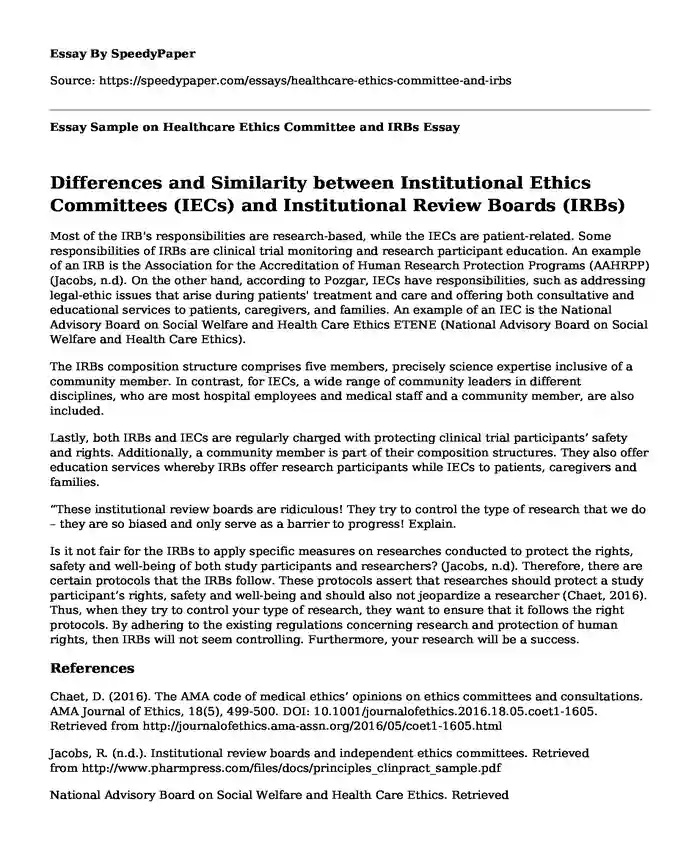
| Essay type: | Compare and contrast |
| Categories: | Medicine Ethical dilemma Comparative literature |
| Pages: | 2 |
| Wordcount: | 447 words |
Differences and Similarity between Institutional Ethics Committees (IECs) and Institutional Review Boards (IRBs)
Most of the IRB's responsibilities are research-based, while the IECs are patient-related. Some responsibilities of IRBs are clinical trial monitoring and research participant education. An example of an IRB is the Association for the Accreditation of Human Research Protection Programs (AAHRPP) (Jacobs, n.d). On the other hand, according to Pozgar, IECs have responsibilities, such as addressing legal-ethic issues that arise during patients' treatment and care and offering both consultative and educational services to patients, caregivers, and families. An example of an IEC is the National Advisory Board on Social Welfare and Health Care Ethics ETENE (National Advisory Board on Social Welfare and Health Care Ethics).
The IRBs composition structure comprises five members, precisely science expertise inclusive of a community member. In contrast, for IECs, a wide range of community leaders in different disciplines, who are most hospital employees and medical staff and a community member, are also included.
Lastly, both IRBs and IECs are regularly charged with protecting clinical trial participants’ safety and rights. Additionally, a community member is part of their composition structures. They also offer education services whereby IRBs offer research participants while IECs to patients, caregivers and families.
“These institutional review boards are ridiculous! They try to control the type of research that we do – they are so biased and only serve as a barrier to progress! Explain.
Is it not fair for the IRBs to apply specific measures on researches conducted to protect the rights, safety and well-being of both study participants and researchers? (Jacobs, n.d). Therefore, there are certain protocols that the IRBs follow. These protocols assert that researches should protect a study participant’s rights, safety and well-being and should also not jeopardize a researcher (Chaet, 2016). Thus, when they try to control your type of research, they want to ensure that it follows the right protocols. By adhering to the existing regulations concerning research and protection of human rights, then IRBs will not seem controlling. Furthermore, your research will be a success.
References
Chaet, D. (2016). The AMA code of medical ethics’ opinions on ethics committees and consultations. AMA Journal of Ethics, 18(5), 499-500. DOI: 10.1001/journalofethics.2016.18.05.coet1-1605. Retrieved from http://journalofethics.ama-assn.org/2016/05/coet1-1605.html
Jacobs, R. (n.d.). Institutional review boards and independent ethics committees. Retrieved from http://www.pharmpress.com/files/docs/principles_clinpract_sample.pdf
National Advisory Board on Social Welfare and Health Care Ethics. Retrieved from http://www.etene.fi/enPozgar, E. Health Care Ethics Committees. Chapter 4. Retrieved, from http://www.jblearning.com/samples/0763764736/64739_CH04_Pozgar.pdf (Focus on pp 142-145)
Cite this page
Essay Sample on Healthcare Ethics Committee and IRBs. (2023, Oct 10). Retrieved from https://speedypaper.com/essays/healthcare-ethics-committee-and-irbs
Request Removal
If you are the original author of this essay and no longer wish to have it published on the SpeedyPaper website, please click below to request its removal:
- Literary Essay Sample: La Estrategia de Chochueca Summary
- Free Essay with a Critical Analysis of The Bronze Horseman
- Essay Sample on Ethical Dilemma at Workplace
- Literary Essay Sample on Racism Exposed in Cry, The Beloved Country
- Essay Sample about Brian Skerry: Education and Photographic Training
- Essay Sample: Analysis of "The Stranger" and "To the Lighthouse"
- Essay Example: Improving Accessibility to Quality Healthcare in Jamaica
Popular categories




